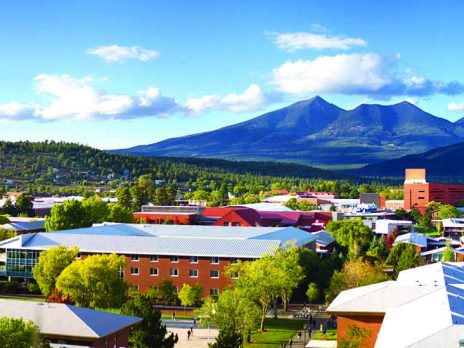Contact the Institute's Project Team
About the Institute
Purpose and Mission Accordion Open
According to a 2019 report by the National Congress of American Indians, 87% of state history standards fail to mention Native American history after 1800, while twenty-seven states make no mention of Indigenous people in their curriculum at all. In Arizona, home to twenty-two federally recognized tribes, Native Americans appear only once in the middle and high school state standards respectively. During this institute, participants will challenge this troubling silence by learning how to incorporate Indigenous histories into their Social Studies classrooms, with a particular focus on the US-Mexico borderlands region.
Borderlands and Indigenous history are both dynamic fields that produced an outpouring of scholarship in recent decades. Unfortunately, U.S. history—in schools and popular imagination—is too often told as the story of British colonies spreading West, and European empires triumphing over weakened Native communities. Yet a major insight to emerge from the growing field of Indigenous borderlands historiography is a challenge to the myth of European domination and Indigenous submission and disappearance–a fact long recognized within tribal communities themselves. Ample scholarship has demonstrated how Indigenous communities across the Americas responded to and resisted European incursion in a variety of ways. Despite tragic losses in human life and the violent dispossession of land, the result of contact was not erasure.
As historian Joaquín Rivaya-Martínez explains, “…despite the ambitious territorial claims of European empires and the independent republics that succeeded them, Indigenous peoples often remained autonomous and retained control over vast expanses of the Western Hemisphere long after their initial contact with Europeans. These statements, now widely accepted among specialists, stand in stark contrast with the Eurocentric views forged and perpetuated by generations of Western scholarly assumptions and misinterpretations, some of which are still common among the general public,” including in K-12 settings.
Educators working in Social Studies classrooms today must have the knowledge and resources to incorporate these histories and historiographical interventions into their teaching, from early units on conquest well into the 20th century. As historian Ned Blackhawk wrote in his National Book Award winning The Rediscovery of America: Native Peoples and the Unmaking of U.S. History, “Focus upon Native American history must be an essential practice of American historical inquiry.” Rivaya-Martínez makes a similar case for understanding Latin American and hemispheric history by highlighting Amerindian “agency, adaptiveness, resilience, sovereignty, and power” preceding and following European contact.
This institute will ensure that educators are well-versed in these histories and have the confidence and resources to bring them to their students. Moreover, they will learn to do so in culturally responsive and sustaining ways, uplifting the histories, cultures, and ways of knowing of Indigenous communities.
Format and Dates Accordion Closed
Monday, July 21st
•9:-9:15 am: Welcome remarks and land acknowledgement
•9:15-10:05 am: Darold Joseph – Laying the Groundwork: Culturally Sustaining and Responsive Orientations of Indigenous Pedagogies
•10:10-11:00 am: Vangee Nez – Navajo Epistemology: Using Sa’ah Naaghai Bik’eh Hozhoon as an Educational Tool
•11:05-11:55 am: Alisse Ali-Joseph – Indigenous Sovereignty, Education and Federal Indian Law/Policy
•11:55-12 pm: Close out
Tuesday, 7/22:
•9:-9:15 am: Welcome remarks and land acknowledgement
•9:15-10:05 am: Eric Meeks – Indigenous Borderlands History: An Introduction
•10:10-11:00 am: Jeffrey Shepherd – We Are an Indian Nation: A History of the Hualapai People
•11:05-11:55 am: Marcus Macktima – Corrupting Identities: Government Interventions and Development of Arizona Apachean Identities of the Nineteenth and Twentieth Centuries
•11:55-12 pm: Close out
Wednesday, 7/23:
•9:-9:10 am: Welcome remarks and land acknowledgement
•9:10-10:00 am: Anabel Galindo – Food as Resilience: Indigenous Foodways in the Borderlands
•10:00-10:50 am: Maurice Crandall – Yavapai and Dilzhe’e Apache History in the Verde Valley
•10:50-11:40am: James Mestaz – Strength from the Waters: Indigenous Water Activism in the US-Mexico Borderlands
•11:40-12:20 am: Lauren Lefty – Partnering with Museums to Create Decolonial Lessons on Indigenous History
•12:20-12:30 pm: Close out
Setting Accordion Closed

All sessions will be held on Zoom.
Event is now over.